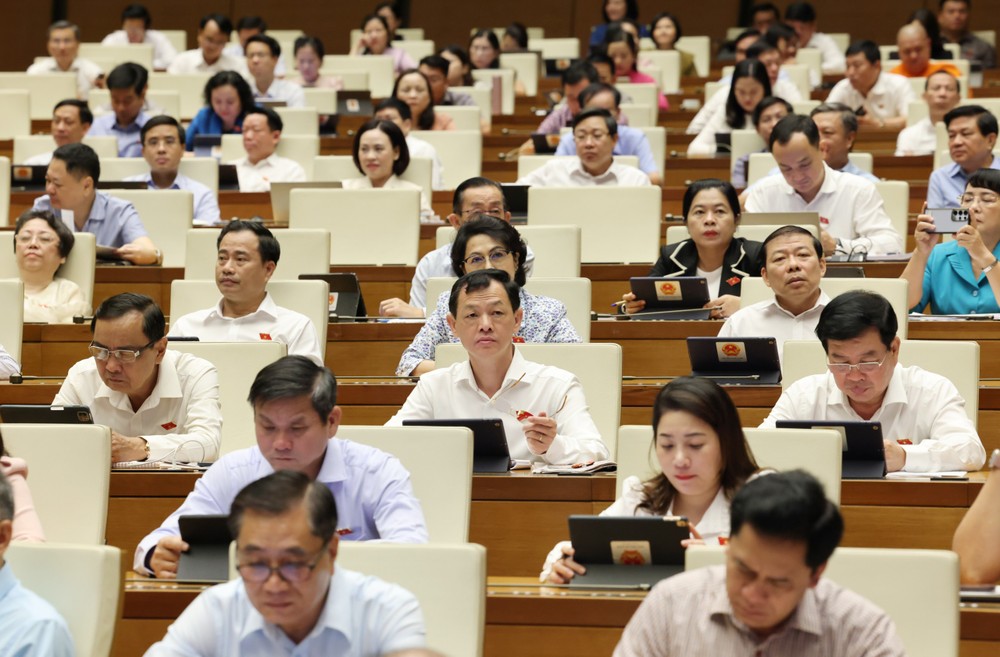
Deputy Vuong Thi Huong from the Northern Province of Ha Giang paid attention to the reduction of the minimum number of years of social insurance payment for participants to receive a pension from 20 years to 15 years while her peer Vuong Thi Huong affirmed that this policy aims to concretize Government’s Resolution No. 28-NQ/TW in 2018 (on social insurance policy reform). According to Deputy Vuong Thi Huong, the policy is consistent with reality when our country's labor market is still in the early stages of development; therefore, it creates opportunities for people who join social insurance late or have intermittent participation to have time to pay social insurance.
However, because the method of calculating the monthly pension is based on the time of contribution to the salary and income as a basis for paying social insurance, reducing the conditions on the time of paying social insurance will cause more retired people with a very low pension especially male workers who only receive 33.75 percent pension.
In addition, the draft law no longer stipulates the lowest monthly pension level. This makes many workers worry about the phenomenon that a part of the population will be poorer in the future. Therefore, he proposed the drafting committee needs to consider designing a shared pension calculation method to support those whose pensions are too low so that such pensioners’ lives can be guaranteed.
Deputy Vo Manh Son from Thanh Hoa Province is also interested in the regulation to reduce the insurance payment period from 20 years to 15 years. He believed that if this plan is approved, a group of workers who join social insurance late when they are about 45-47 years old, or those who participate intermittently but have not yet reached retirement age can enjoy monthly pensions.
According to him, although the pension level may be a bit modest, the monthly salary is stable, periodically adjusted by the State and health care insurance will be paid by the Social Insurance Fund, these retirees still have a better life in old age.
Furthermore, the Article 53 of the draft stipulates that during pregnancy, female employees are allowed to take time off work to go for prenatal checkups up to 5 times. The maximum time off from work for prenatal check-ups is 2 days for each prenatal check-up. Deputy Nguyen Thi Yen Nhi from the Mekong Delta Province of Ben Tre said that in fact, through meetings with voters who are workers and employees in businesses and industrial parks, they voiced their opinions that during a routine pregnancy, their doctor usually orders a re-examination after 30 days.
The draft law stipulates that female employees can only take time off work to go for prenatal checkups a maximum of 5 times in case the fetus develops under normal conditions; however, if the fetus develops abnormally, pregnant female workers must see doctors after one week or 10 days, 15 days or have to go for doctors’ follow-up check-up.
As a result, she proposed increasing the number of prenatal check-ups to 9-10 times during pregnancy to ensure that female workers have adequate health monitoring for the fetus to develop well.
Regarding social pension benefits, Deputy Nguyen Huu Thong in Binh Thuan Province said that the draft stipulates 75 years of age or older, but this age is too high compared to the average life expectancy of our country's current population. As per the General Statistics Office’s figure, in 2023, the average life expectancy of the country's population was 73.7 years and it was 73.6 years in 2022.
Therefore, he suggested that the government should consider a lower age than the average life expectancy of the country today for receiving social pension benefits.
Deputy Nguyen Duy Thanh in Ca Mau Province was concerned about the issue of pensions due to early retirement. In fact, many workers wish to retire early, so this draft of the Social Insurance Law (amended) needs to supplement regulations allowing workers to enjoy early pension and early leave at most 5 years compared to retirement age.
























